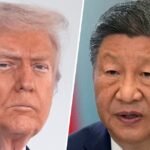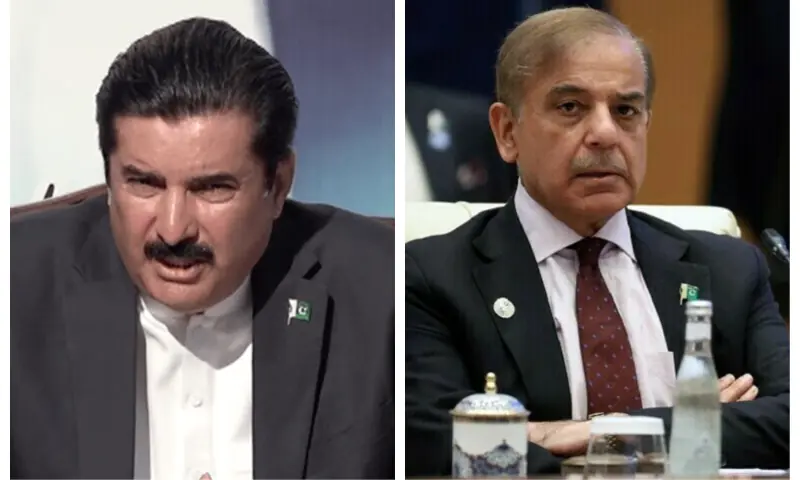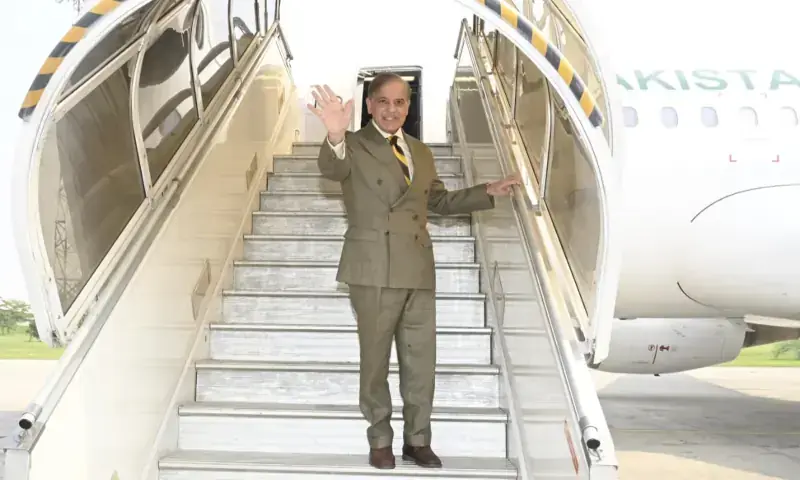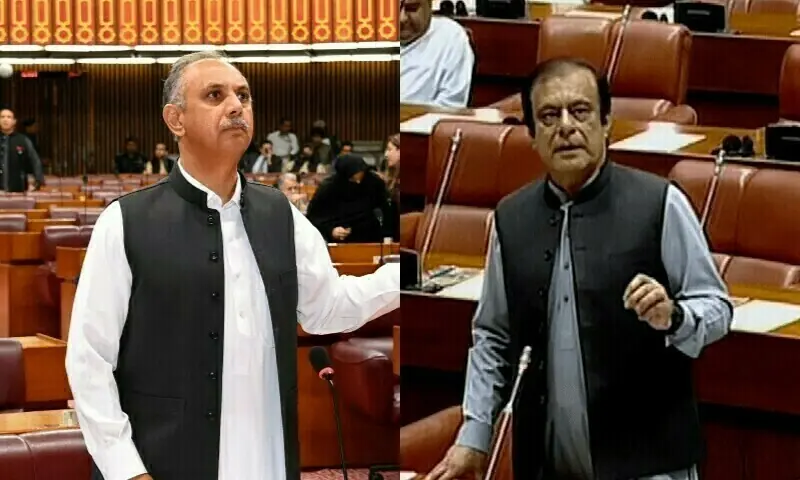Khyber Pakhtunkhwa Governor Faisal Karim Kundi on Monday sought Prime Minister Shehbaz Sharif’s intervention against “unconstitutional restrictions” on inter-provincial movement of wheat into the province.
This development comes as the Punjab government has faced criticism from the KP and Sindh governments for choking the flow of wheat to the two provinces. However, a day earlier, Punjab Information Minister Azma Bokhari insisted that there was no ban on inter-provincial movement of wheat, calling the “ongoing propaganda in this regard baseless and contrary to facts”.
In a post today on social media platform
“These limitations not only affect the food security of the province but also go against the spirit of cooperative federalism enshrined in our Constitution,” he stated.
He expressed confidence that the matter would be resolved quickly “under the leadership of the prime minister.”
The letter, which Kundi also published on
He said the restrictions were against Article 151 of the Constitution, which guaranteed freedom of trade, commerce and commerce between the provinces.
“Any disruption to supply risks creating artificial shortages, price escalation and public hardship,” he said.
“It has further been observed that these limitations unintentionally encourage illegal and informal transportation of wheat through alternative means and routes, resulting in uncontrollable supply distortions in the open market. This diversion is causing [a] rapid escalation of wheat and flour prices, placing a direct burden on the general public and potentially triggering unwarranted public resentment,” he said.
Kundi sought Prime Minister Shehbaz’s “immediate and kind intervention in this matter and direction to concerned authorities” to remove the restrictions to ensure “uninterrupted and legally protected movement of wheat” to KP.
“I remain confident that under your leadership, the constitutional rights of the people of KP will be safeguarded effectively and without delay,” he said.
Kundi seeks to restore daily international flights from Peshawar
On the other hand, the KP governor wrote to Defense Minister Khawaja Asif, requesting him to restore daily flights between Peshawar and Karachi, as well as international flights, “particularly to the Gulf and Middle East countries.”
“The suspension of these (international) flights has caused considerable hardship to overseas Pakistanis, businessmen and their families,” Kundi said in a subsequent post on X, noting that a “large expatriate population” from KP was employed in the Middle East.
Kundi further said that “a single private airline is operating with an absolute monopoly” on the Peshawar-Karachi route, inconveniencing people and traders due to exorbitant fares and limited seat availability.
The governor asked Asif to issue directions to restore flight services and added, “I also sincerely hope and pray that our national flag carrier will rise once again to dominate the skies of the world as it did gloriously during the golden decades of the 1960s and 1970s.”
KP’s complaints
Following the recent floods, the Punjab government had begun tightening controls on the inter-provincial movement of wheat and flour through a permit regime to curb price increases within the province, a move that has been particularly denounced by KP amid rising prices and wheat shortages.
The restrictions have also drawn harsh criticism from flour millers, who argue they violate constitutional rights and a recent deregulation agreement.
While Punjab officials denied a formal ban, they acknowledged setting up checkpoints to curb what they called “unusual” movement of wheat.
On September 7, Kundi lamented reports that Punjab had banned the movement of wheat to other provinces. He had issued another condemnation of the reported ban the following day in a post on social media platform X.
“The arbitrary ban imposed on August 31, 2025 by the Punjab Government on supply of wheat and flour to Khyber Pakhtunkhwa is a flagrant violation of Article 151 of the Constitution and a gross violation of national unity,” Kundi had said in X.
Article 151 of the Constitution states that “trade and intercourse throughout Pakistan shall be free,” but empowers parliament to “impose such restrictions on freedom of trade and intercourse between one province and another or within any part of Pakistan as may be necessary in the public interest.”
The KP governor added: “As a result, the price of a 20kg bag of flour has skyrocketed to around Rs 1,200 in Punjab and up to Rs 2,800 in KP, an unbearable burden for families already struggling with inflation.
“On behalf of the people of KP, I strongly condemn this discriminatory act and urge the Chief Minister of Punjab [Maryam Nawaz] not only condemn but also immediately withdraw this verbal prohibition.”
Meanwhile, on September 7, the KP Assembly unanimously passed a resolution denouncing the Punjab government’s “restrictions” on wheat supplies amid claims of a 68 per cent rise in flour prices across the province.
The government subsequently approved a national wheat policy earlier this month. According to a statement issued by the Prime Minister’s Office, stakeholders were informed during a policy briefing that there would be no restrictions on inter-provincial movement of wheat.
Then, in a letter dated October 23, the KP government had asked Punjab to remove restrictions on inter-provincial movement of wheat and flour, warning that the restrictions were disrupting supply chains, increasing prices and threatening food security in the province.
The KP food secretary, in a letter to his Punjab counterpart, said lifting the ban was essential to restore a smooth supply chain, stabilize market prices and safeguard food security of his province.
The letter said KP, a wheat-deficient province, was dependent on inter-provincial supplies from Punjab to meet its needs – about 14,500 tonnes per day.
“The current restrictions have severely disrupted the flow of wheat and flour into the province, thereby threatening food availability and destabilizing market prices,” it reads.
While KP acknowledged Punjab’s recent permit-based allocation of 2,000 tonnes of flour for transportation to KP, it termed the quota “insufficient” in relation to actual needs.
KP regretted that despite repeated communications by his chief secretary, food secretary and food director to Punjab, the ban remained in force.
“This situation is inconsistent with the provisions of Article 151(1) of the Constitution of the Islamic Republic of Pakistan, which guarantees freedom of inter-provincial trade and movement of goods throughout the country,” the letter said.
The letter added that the issue was raised at a high-level meeting, chaired by Prime Minister Shehbaz, on October 17 on the Interim Wheat Policy 2025.
“The KP Flour Mills Association has repeatedly expressed serious concern over the rapid depletion of wheat stocks, warning that unavailability of wheat and flour may emerge in the coming days if restrictions persist,” he said.
Meanwhile, PPP leaders in Sindh also lashed out at the Punjab government, accusing it of restricting the supply of wheat seeds.
Last week, KP Chief Minister Sohail Afridi again condemned Punjab’s “ban” on transportation of wheat and flour to the province, calling it a violation of the Constitution and “an attack on the rights” of the people of the province.
Chairing a meeting, he directed the top brass of the food department to write a letter to the Punjab government demanding immediate removal of all restrictions to ensure free movement of wheat and its flour across provincial borders, according to a statement from the chief minister’s secretariat. Afridi said hiding behind political differences to deprive citizens of their needs was unacceptable.
Officials told the meeting that KP consumes around 5.3 million tonnes of wheat and flour annually, of which only 1.5 million tonnes are produced locally, while the rest comes from Punjab and other provinces.








